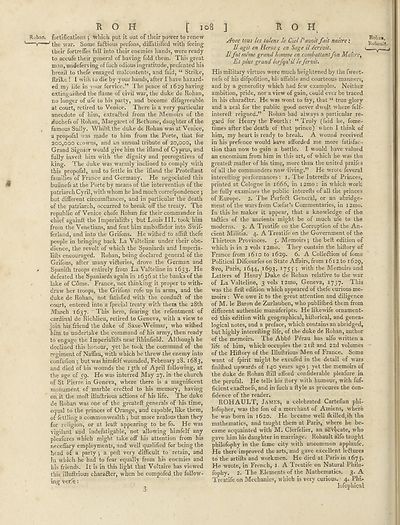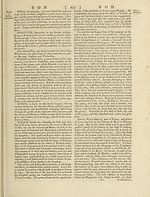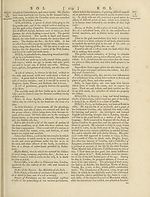Encyclopaedia Britannica, or, a Dictionary of arts, sciences, and miscellaneous literature : enlarged and improved. Illustrated with nearly six hundred engravings > Volume 18, RHI-SCR
(116) Page 108
Download files
Complete book:
Individual page:
Thumbnail gallery: Grid view | List view

4
R O H [ 108 ]
R O H
I
Rohan, fortifications ; Ivhich put it out of their power to renew
“’'V*—**' the war. Some faftious perfons, diflatisfied with feeing
their fortreffes fall into their enemies hands, were ready
to accufe their general of having fold them. This great
man, undeferving of fuch odious ingratitude, prefented his
breail to thefe enraged malcontents, and faid, “ Strike,
ftrikt ! I with to die by your hands, after I have hazard¬
ed m7 life in your fervice.” The peace of 1629 having
extinguilhed the dame of civil war, the duke de Rohan,
no longer of ufe to his party, and become difagreeable
at court, retired to Venice. There is a very particular
anecdote of him, extracted from the Memoirs of the
duchefs of Rohan, Margaret of Bethune, daughter of the
famous Sully. Whilft the duke de Rohan was at Venice,
a propofal was made to him from the Porte, that for
200,000 crowns, and an annual tribute of 20,000, the
Grand Sigmor would give him the ifland of Cyprus, and
fully invelt him with the dignity and prerogatives of
king. The duke was warmly inclined to comply with
this propofal, and to fettle in the ifland the Proteftant
families of France and Germany. He negociated this
bufinefs at the Porte by means of the intervention of the
patriarch Cyril, with whom he had much correfpondence ;
but different circumftances, and in particular the death
of the patriarch, occurred to break off the treaty. The
republic of Venice chofe Rohan for their commander in
chief againft the Imperialirts j but Louis III. took him
from the Venetians, and fent him ambaffador into Swif-
ferland, and into the Grifons. He wifhed to affift thefe
people in bringing back La Valteline under their obe¬
dience, the revolt of which the Spaniards and Imperia-
lilts encouraged. Rohan, being declared general of the
Grifons, after many viftories, drove the German and
.* Spanifh troops entirely from La Valteline in 1633. He
defeated the Spaniards again in 1636 at the banks of the
lake of Come. France, not thinking it proper to with¬
draw her troops, the Grifons rofe up in arms, and the
duke de Rohan, not fatisfied with the condufl of the
court, entered into a fpecial treaty with them the 28th
March 1637. This hero, fearing the refentment of
cardinal de Richlieu, retired to Geneva, with a view to
join his friend the duke of Saxe-Weimar, who wifhed
him to undertake the command of his army, then ready
to engage the Imperialitls near Rhinfield. Although he
declined this honour, yet he took the command of the
regiment of Naffau, with which he threw the enemy into
confuhon ; but was himfelf wounded, February 28. 1683,
and died of his wounds the 13th of April following, at
the age of 59. He was interred May 27. in the church
of St Pierre in Geneva, where there is a magnificent
monument of marble ere&ed to his memory, having
on it die moft illuftrious actions of his life. The duke
de Rohan was one of the greateft generals of his time,
equal to the princes of Orange, and capable, like them,
of fettling a commonwealth ; but more zealous than they
for religion, or at leaf! appearing to be fo. He was
vigilant and indefatigable, not allowing himfelf any
pleafures which might take off his attention from his
neceffary employments, and well qualified for being the
head of a party ; a poll very difficult to retain, and
In which he had to fear equally from his enemies and
his friends. It is in this light that Voltaire has viewed
this illuftrious charadler, when he compofed the follow¬
ing verfe:
Avec tous les tulens lc del l'avail fait naitre:
ll agit en Hcros ; en Sage il ecrivit.
11 fut me me grand homme en cornbattant fan Maitre>
Et plus grand lorfqu'il le fervit.
Rohaa.
Rohault.
His military virtues were much heightened by the fweet-
nefs of his difpofition, his affable and courteous manners,
and by a generofity which had few examples. Neither
ambition, pride, nor a view of gain, could ever be traced
in his character. He was wont to fay, that “ true glory
and a zeal for the public good never dwelt where felf-
intereft reigned.” Rohan had always a particular re¬
gard for Henry the Fourth : “ Truly (faid he, fome-
times after the death of that prince) when I think of
him, my heart is ready to break. A wound received
in his prefence would have afforded me more fatisfac-
tion than now to gain a battle. I would have valued
an encomium from him in this art, of which he wTas the
greateft mafter of his time, more than the united praifes
of all the commanders now living.” He wrote feveral
interefting performances: 1. The Interefts of Princes,
printed at Cologne in 1666, in i2mo : in which work
he fully examines the public interefts of all the princes
of Europe. 2. The Perfeft General, or an abridge¬
ment of the wars from Caefar’s Commentaries, in 12mo.
In this he makes it appear, that a knowledge of the
taffies of the ancients might be of much ufe to the
moderns. 3. A Treatife on the Corruption of the An¬
cient Militia. 4. A Treatife on the Government of the
Thirteen Provinces. 5. Memoirs; the beft edition of
which is in 2 vols 12mo. They contain the hiftory of
France from 1610 to 1629. 6. A Colleflion of fome
Political Difcourfes on State Affairs, from 1612 to 1629,
8vo, Paris, 1644, I^93> I755 5 the Memoirs and
Letters of Henry Duke de Rohan relative to the war
of La Valteline, 3 vols T2mo, Geneva, 1757. This
was the firft edition which appeared of thefe curious me¬
moirs : We owe it to the great attention and diligence
of M. le Baron de Zurlauben, who publilhed them from
different authentic manuferipts; He likewife ornament¬
ed this edition with geographical, hiftorical, and genea¬
logical notes, and a preface, which contains an abridged,
but highly interefting life, of the duke de Rohan, author
of the memoirs. The Abbd Perau has alfo written a
life of him, which occupies the 21ft and 22d volumes
of the Hiftory of the Illuftrious Men of France. Some
want of fpirit might be excufed in the detail of wars
finiffied upwards of 140 years ago; yet the memoirs of
the duke de Rohan ftill afford confiderable pleafure in
the perufal. He tells his liory with humour, with fuf-
ficient exadtnefs, and in fuch a ftyle as procures the con¬
fidence of the reader.
ROHAULT, James, a celebrated Cartefian phi-
lofopher, was the fon of a merchant of Amiens, where
he was born in J620. He became well {killed,in the
mathematics, and taught them at Paris, where he be¬
came acquainted with M. Clerfelier, an advocate, who
gave him his daughter in marriage. Rohault alfo taught
philofophy in the fame city with uncommon applaufe.
He there improved the arts, and gave excellent ledures
to the artifts and workmen. He died at Paris in 1675.
He wrote, in French, 1 A Treatife on Natural Philo¬
fophy. 2. The Elements of the Mathematics. 3. A
Treatife on Mechanics, which is very curious. 4. PhL
lofophica!
3
R O H [ 108 ]
R O H
I
Rohan, fortifications ; Ivhich put it out of their power to renew
“’'V*—**' the war. Some faftious perfons, diflatisfied with feeing
their fortreffes fall into their enemies hands, were ready
to accufe their general of having fold them. This great
man, undeferving of fuch odious ingratitude, prefented his
breail to thefe enraged malcontents, and faid, “ Strike,
ftrikt ! I with to die by your hands, after I have hazard¬
ed m7 life in your fervice.” The peace of 1629 having
extinguilhed the dame of civil war, the duke de Rohan,
no longer of ufe to his party, and become difagreeable
at court, retired to Venice. There is a very particular
anecdote of him, extracted from the Memoirs of the
duchefs of Rohan, Margaret of Bethune, daughter of the
famous Sully. Whilft the duke de Rohan was at Venice,
a propofal was made to him from the Porte, that for
200,000 crowns, and an annual tribute of 20,000, the
Grand Sigmor would give him the ifland of Cyprus, and
fully invelt him with the dignity and prerogatives of
king. The duke was warmly inclined to comply with
this propofal, and to fettle in the ifland the Proteftant
families of France and Germany. He negociated this
bufinefs at the Porte by means of the intervention of the
patriarch Cyril, with whom he had much correfpondence ;
but different circumftances, and in particular the death
of the patriarch, occurred to break off the treaty. The
republic of Venice chofe Rohan for their commander in
chief againft the Imperialirts j but Louis III. took him
from the Venetians, and fent him ambaffador into Swif-
ferland, and into the Grifons. He wifhed to affift thefe
people in bringing back La Valteline under their obe¬
dience, the revolt of which the Spaniards and Imperia-
lilts encouraged. Rohan, being declared general of the
Grifons, after many viftories, drove the German and
.* Spanifh troops entirely from La Valteline in 1633. He
defeated the Spaniards again in 1636 at the banks of the
lake of Come. France, not thinking it proper to with¬
draw her troops, the Grifons rofe up in arms, and the
duke de Rohan, not fatisfied with the condufl of the
court, entered into a fpecial treaty with them the 28th
March 1637. This hero, fearing the refentment of
cardinal de Richlieu, retired to Geneva, with a view to
join his friend the duke of Saxe-Weimar, who wifhed
him to undertake the command of his army, then ready
to engage the Imperialitls near Rhinfield. Although he
declined this honour, yet he took the command of the
regiment of Naffau, with which he threw the enemy into
confuhon ; but was himfelf wounded, February 28. 1683,
and died of his wounds the 13th of April following, at
the age of 59. He was interred May 27. in the church
of St Pierre in Geneva, where there is a magnificent
monument of marble ere&ed to his memory, having
on it die moft illuftrious actions of his life. The duke
de Rohan was one of the greateft generals of his time,
equal to the princes of Orange, and capable, like them,
of fettling a commonwealth ; but more zealous than they
for religion, or at leaf! appearing to be fo. He was
vigilant and indefatigable, not allowing himfelf any
pleafures which might take off his attention from his
neceffary employments, and well qualified for being the
head of a party ; a poll very difficult to retain, and
In which he had to fear equally from his enemies and
his friends. It is in this light that Voltaire has viewed
this illuftrious charadler, when he compofed the follow¬
ing verfe:
Avec tous les tulens lc del l'avail fait naitre:
ll agit en Hcros ; en Sage il ecrivit.
11 fut me me grand homme en cornbattant fan Maitre>
Et plus grand lorfqu'il le fervit.
Rohaa.
Rohault.
His military virtues were much heightened by the fweet-
nefs of his difpofition, his affable and courteous manners,
and by a generofity which had few examples. Neither
ambition, pride, nor a view of gain, could ever be traced
in his character. He was wont to fay, that “ true glory
and a zeal for the public good never dwelt where felf-
intereft reigned.” Rohan had always a particular re¬
gard for Henry the Fourth : “ Truly (faid he, fome-
times after the death of that prince) when I think of
him, my heart is ready to break. A wound received
in his prefence would have afforded me more fatisfac-
tion than now to gain a battle. I would have valued
an encomium from him in this art, of which he wTas the
greateft mafter of his time, more than the united praifes
of all the commanders now living.” He wrote feveral
interefting performances: 1. The Interefts of Princes,
printed at Cologne in 1666, in i2mo : in which work
he fully examines the public interefts of all the princes
of Europe. 2. The Perfeft General, or an abridge¬
ment of the wars from Caefar’s Commentaries, in 12mo.
In this he makes it appear, that a knowledge of the
taffies of the ancients might be of much ufe to the
moderns. 3. A Treatife on the Corruption of the An¬
cient Militia. 4. A Treatife on the Government of the
Thirteen Provinces. 5. Memoirs; the beft edition of
which is in 2 vols 12mo. They contain the hiftory of
France from 1610 to 1629. 6. A Colleflion of fome
Political Difcourfes on State Affairs, from 1612 to 1629,
8vo, Paris, 1644, I^93> I755 5 the Memoirs and
Letters of Henry Duke de Rohan relative to the war
of La Valteline, 3 vols T2mo, Geneva, 1757. This
was the firft edition which appeared of thefe curious me¬
moirs : We owe it to the great attention and diligence
of M. le Baron de Zurlauben, who publilhed them from
different authentic manuferipts; He likewife ornament¬
ed this edition with geographical, hiftorical, and genea¬
logical notes, and a preface, which contains an abridged,
but highly interefting life, of the duke de Rohan, author
of the memoirs. The Abbd Perau has alfo written a
life of him, which occupies the 21ft and 22d volumes
of the Hiftory of the Illuftrious Men of France. Some
want of fpirit might be excufed in the detail of wars
finiffied upwards of 140 years ago; yet the memoirs of
the duke de Rohan ftill afford confiderable pleafure in
the perufal. He tells his liory with humour, with fuf-
ficient exadtnefs, and in fuch a ftyle as procures the con¬
fidence of the reader.
ROHAULT, James, a celebrated Cartefian phi-
lofopher, was the fon of a merchant of Amiens, where
he was born in J620. He became well {killed,in the
mathematics, and taught them at Paris, where he be¬
came acquainted with M. Clerfelier, an advocate, who
gave him his daughter in marriage. Rohault alfo taught
philofophy in the fame city with uncommon applaufe.
He there improved the arts, and gave excellent ledures
to the artifts and workmen. He died at Paris in 1675.
He wrote, in French, 1 A Treatife on Natural Philo¬
fophy. 2. The Elements of the Mathematics. 3. A
Treatife on Mechanics, which is very curious. 4. PhL
lofophica!
3
Set display mode to:
![]() Universal Viewer |
Universal Viewer | ![]() Mirador |
Large image | Transcription
Mirador |
Large image | Transcription
Images and transcriptions on this page, including medium image downloads, may be used under the Creative Commons Attribution 4.0 International Licence unless otherwise stated. ![]()
| Permanent URL | https://digital.nls.uk/193020215 |
|---|
| Attribution and copyright: |
|
|---|
| Description | Ten editions of 'Encyclopaedia Britannica', issued from 1768-1903, in 231 volumes. Originally issued in 100 weekly parts (3 volumes) between 1768 and 1771 by publishers: Colin Macfarquhar and Andrew Bell (Edinburgh); editor: William Smellie: engraver: Andrew Bell. Expanded editions in the 19th century featured more volumes and contributions from leading experts in their fields. Managed and published in Edinburgh up to the 9th edition (25 volumes, from 1875-1889); the 10th edition (1902-1903) re-issued the 9th edition, with 11 supplementary volumes. |
|---|---|
| Additional NLS resources: |
|

